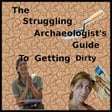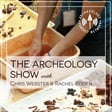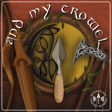
G'Day Fela - Episode 6
I hope you’re ready to break the rules as we say “piss it” to boring old news stories and go a little unscripted as we discuss my undying love for the land down under. That’s right, that mystical continent on the other side of the world was once my home- and not just me, it’s the home of the Croc Hunter (well, was…), Javert, Wolverine, The Hulk/Nero/Hector, Eomer and Galadriel, The Joker, that stupid girl that married Legolas that I will hate forever and ever, and Nicole Kidman!
But seriously, I could talk about Australia for weeks on end and never tire. And good on ya for having a listen while I have a go at it fair dinkum. So I thought since my corpus of knowledge on Aussie stuff if fairly large I would go a little crazy (or “crack a fruity”) and have an unscripted discussion about my interests in Australian anthropology. Because it’s the largest component of history on the continent, the main portion of this episode is on Aboriginal anthropology and archaeology (though I do give a short background and my thoughts on convict archaeology, squeeeeeee!)
There’s a soapbox on the use of the term “aborigine,” an explanation of the biological debate over Aboriginal ancestry, a quick trip through the Dreamtime and its theoretical implications, a story about two giant dog spirits and what that has to do with survival in the Outback, a related and totally non-random story about the worst (but most exciting) day of my life, and a quick history of colonialism and why that makes me really old…
That about sums it up, though I do have to explain a few things that I mention in the episode:
1. I have since learned how to drive a standard, thank you very much.
2. I was honestly sad when Steve Irwin died, he had two little kids for goodness’ sake, I’m not heartless!
3. When I say that the majority of Aboriginal People don’t live traditional lifestyles anymore, it doesn’t mean they are completely cut off from that way of life. Many still have relatives whom they visit, and many live in small communities outside of the mainstream (not so different from our reservations). I once took a 30 hour bus trip from Alice Springs to Melbourne which took us through the middle of the Outback, and at one point about 4 hours since we’d seen any signs of life aside from kangaroos and camels (yes, there are camels in the Outback) a lone Aboriginal man signaled for the bus driver to stop- he got off the bus and proceeded to literally walk away into the sunset… in the middle of the desert. Even though it all looked like the same endless desert to us, this man (who was fully dressed in western clothing) knew the landscape of his people, and I assume he was going to meet some tribesmen or family at their campsite. Have to admit that kind of blew my mind. Also the camel thing, I didn’t know that either.
4. Did I mention my phone booth got hit by lightening and I drove through fire?
5. No, Australians don’t have biscuits (like biscuick biscuits). If you try to describe to them what this delicious savory snack is they get very confused, because to them a cookie is a biscuit. I wouldn’t go into it if I were you.
6. My accents need some work, I know
7. In the end I basically said: Hey friends, why don’t you go down and throw some shrimp on the grill down on Bondi Beach, or eat some breakfast in the bushy desert, as long as you aren’t an idiot getting drunk in some bar until you thow up everywhere and die. That’s the truth, because there’s no room for fools in Australia, and that’s all from this girl… (don’t think too hard about this, it was just a demonstration of Aussie slang)
8. People who live in Australia do, in fact, drink lots of beer and eat lots of sausages. It’s the national pastime…
McNiven OUT!





